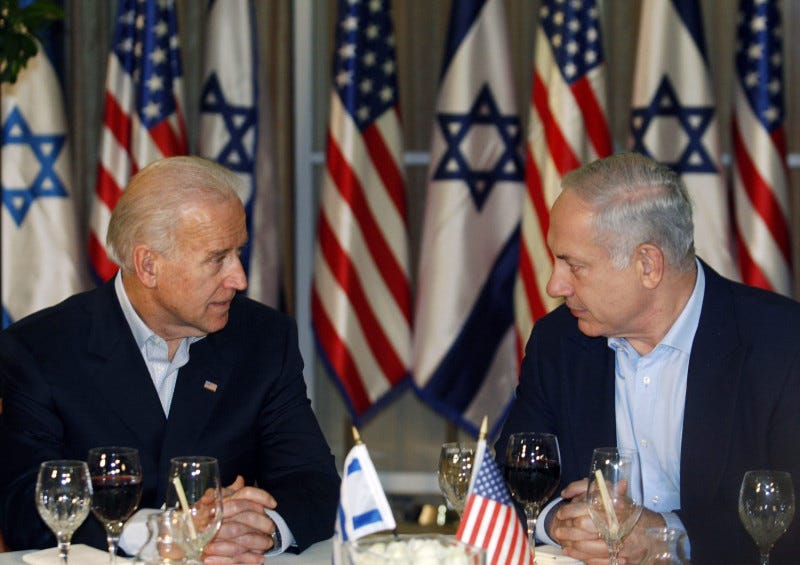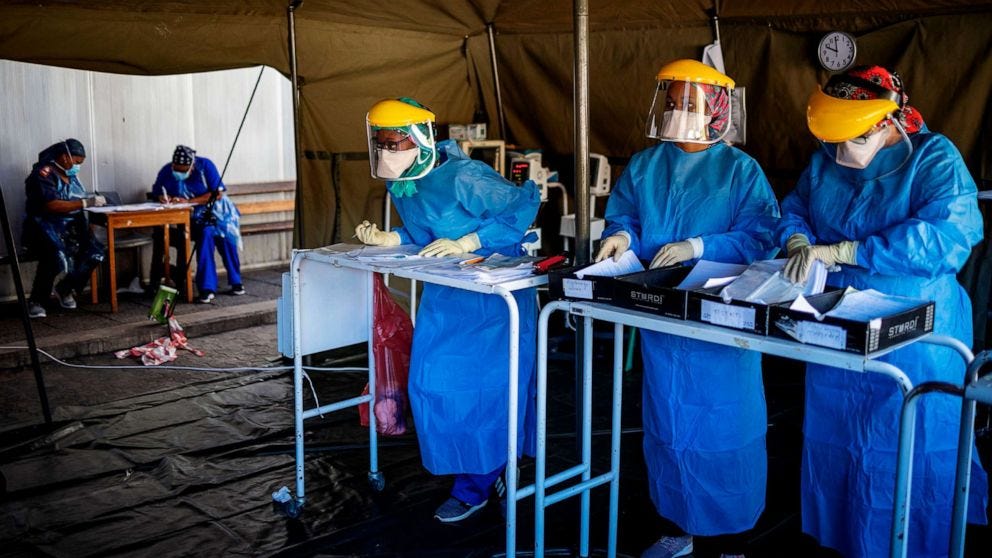Wake Up To Politics - May 21, 2021
Wake Up To Politics: Inside Biden’s quiet Mideast diplomacy
Good morning! It’s Friday, May 21, 2021. Election Day 2022 is 536 days away. Election Day 2024 is 1,264 days away.
Inside Biden’s “quiet and relentless” Mideast diplomacy
After 11 days of deadly fighting, a cease-fire between Israel and Hamas took effect at 7 p.m. Eastern Time on Thursday. The truce, which was mediated by Egypt and accepted by both sides, has held so far in its fragile early hours.
The violence of the past two weeks was the worst between Israel and Hamas since a 49-day war in 2014. At least 243 Palestinians in Gaza were killed by recent Israeli airstrikes; 12 Israelis were killed by more than 4,000 rockets fired by Hamas. Most of the victims on both sides were civilians.
“I believe the Palestinians and Israelis equally deserve to live safely and securely and to enjoy equal measures of freedom, prosperity, and democracy,” President Joe Biden said in a brief address on Thursday hailing the ceasefire.
In his remarks, Biden emphasized his steadfast support for “Israel’s right to defend itself,” while also promising to work with the Palestinian Authority to provide humanitarian assistance for the people of Gaza. He offered his “sincere condolences” to those who had lost relatives on both sides of the fighting.
With the cease-fire in place, Biden has weathered not just one of his first international crises — but one of his most significant domestic splits within the Democratic Party.
While both parties have historically aligned in support of Israel during past conflicts in the Middle East, progressive Democrats have grown steadily more critical of Israel and exerted pressure on Biden to speak out more forcefully against the country’s actions throughout the conflict.
Even with the violence in Israel and Gaza over, the intraparty divide in Washington is unlikely to fade away: Sen. Bernie Sanders (I-VT) and Rep. Alexandria Ocasio-Cortez (D-NY) have introduced resolutions that would block a planned $735 million arms sale to Israel, which the Biden administration had already signed off on.
Although Biden eventually joined progressives in pushing for a cease-fire, most of his diplomacy took place behind the scenes. According to the Associated Press, the president and his top aides held over 80 meetings or phone calls with foreign officials during the crisis. Biden himself spoke six times with Israeli Prime Minister Benjamin Netanyahu and repeatedly with Palestinian Authority President Mahmoud Abbas, engagements he referred to as “quiet and relentless diplomacy.”
While Biden did not waver publicly in his support of Israel, he reportedly grew sharper with Netanyahu privately as the week wore on. The two leaders share a long and complicated relationship dating back to the 1980s, when Biden was a senior member of the Senate Foreign Relations Committee and Netanyahu served as Israel’s ambassador to the United Nations.
In the Senate, foreign affairs were Biden’s calling card, but he has mostly shied away from major diplomatic efforts in the White House. Biden began his presidency signaling that he had little interest in focusing on the Middle East or attempting to solve the Israeli-Palestinian conflict.
The intense focus on domestic affairs was one way he was able to keep the Democratic Party united in the early months of his presidency; fractures in the party began to show in the past week as the split over supporting Israel grew larger.
Although Biden would likely prefer to keep the attention on his economic agenda, it is possible that events will once again get in the way. He has already deployed Secretary of State Antony Blinken to visit the Middle East in the coming days and meet with Israeli and Palestinian leaders, a sign that the Biden administration might be preparing for a larger push in the region going forward.
The Rundown
More headlines to know this morning.
Washington Post: “Chris Cuomo took part in strategy calls advising his brother, the New York governor, on how to respond to sexual harassment allegations”
The Hill: “Progressives nearly tank House Democrats’ Capitol security bill”
CNN: “Trump administration secretly obtained CNN reporter's phone and email records”
Policy Roundup: Health
The week’s top health policy news, by Ellen Burstein.
President Biden pledged on Monday to send 20 million doses of the Moderna, Pfizer, and Johnson and Johnson vaccines abroad by the end of June. The president also promised last month to donate an additional 60 million doses of the AstraZeneca vaccine, which has not been approved for use in the United States, to other countries. The Biden administration also previously backed a proposed waiver of intellectual property protections for the Covid vaccines.
However, many international health activists say the donation is insufficient. “Donating 80 million doses of vaccines without a plan to scale up production worldwide is like putting a Band-Aid on a machete wound,” Gregg Gonsalves, an AIDS activist, told the New York Times. The World Health Organization has urged countries with access to vaccines to support other regions being overwhelmed by coronavirus surges and more contagious variants.
Meanwhile, a new study found that severe Covid cases in Africa are more fatal than cases in other parts of the world. Among 3,077 critically ill Covid patients admitted to the hospital, 48.2% died within 30 days, compared to 31.5% internationally. A lack of resources, including a lack of dialysis machines and surge capacity in intensive care units, contributed to the death rate, according to the study, published in the journal Lancet. However, in some cases, physicians failed to use available techniques like “proning” the patient on their stomach to aid with breathing, according to the authors.
More health headlines, via Ellen:
The European Union announced it will allow fully-vaccinated travelers and tourists from Covid-safe countries with limited coronavirus transmission to visit.
An Israeli airstrike damaged Gaza’s only lab for processing coronavirus tests, raising concerns that the latest violence in the region may fuel a coronavirus outbreak. Six hospitals and 11 primary healthcare centers have also been damaged.
A study in the New England Journal of Medicine found that the Covid vaccine “significantly curbed” the virus’ transmission in nursing homes.
And a French study found that dogs may be able to sniff out coronavirus from sweat almost as well as a PCR test.
Ellen’s food for thought: In The Atlantic, Ed Yong talks with psychiatrists and mental health experts about the mental health impacts of the pandemic, which are set to linger long after Americans return to the “new normal.”
“[Experts] agreed that the rhetoric of individual resilience can often be used to plaster over institutional failures: the shortage of mental-health-care providers, the labyrinthine insurance system, the lack of support from employers, the stigma around seeking care at all, and the societal tendency to bottle grief,” Yong writes.
Daybook
What’s happening in Washington today. (All times Eastern.)
President Joe Biden will receive his daily intelligence briefing at 9 a.m. Later, at 12:35 p.m., he will welcome President Moon Jae-in of South Korea to the White House. At 1 p.m., Biden will award the Medal of Honor to 94-year-old retired Army Colonel Ralph Puckett for “conspicuous gallantry during the Korean War.” Moon and First Lady Jill Biden will also attend.
At 2:15 p.m., Biden will participate in a bilateral meeting with Moon. The two leaders will participate in an expanded bilateral meeting at 3:15 p.m. and in a press conference at 5 p.m. According to Bloomberg, Moon is expected to urge Biden to revive nuclear talks with North Korea, “a last-ditch attempt to bring the U.S. and North Korea together” before his term as South Korea’s leader ends next year.
Vice President Kamala Harris will hold a bilateral meeting with Moon at 10 a.m. Harris and Second Gentleman Doug Emhoff will attend the Medal of Honor ceremony at 1 p.m.
White House Press Secretary Jen Psaki will hold a press briefing at 12 p.m.
U.S. public health officials will hold a press briefing at 11 a.m. on the COVID-19 response effort. Participants will include Dr. Anthony Fauci, CDC Director Rochelle Walensky, and Surgeon General Vivek Murthy.
The Senate is not in session.
The House will convene at 9 a.m. for a brief pro forma session.
The Supreme Court is not in session.
Thanks for waking up to politics! If you enjoy reading this newsletter, I’d be so grateful if you’d consider donating to help support me and my work. If you want to show off your support for Wake Up To Politics, you can also buy some merchandise.
Also: don’t forget to tell your friends and family to sign up for the newsletter at wakeuptopolitics.com. And if you have any questions or comments, feel free to email me at any time.







